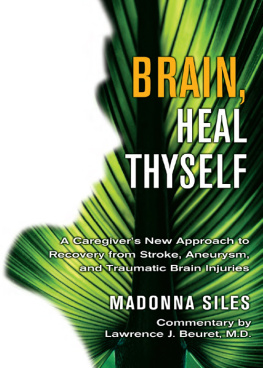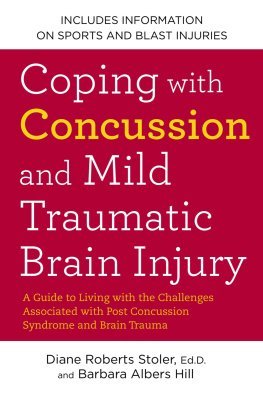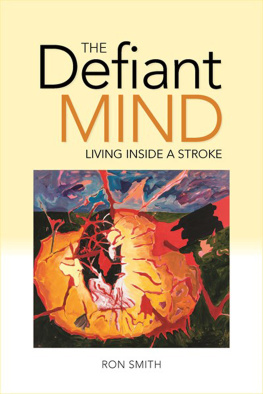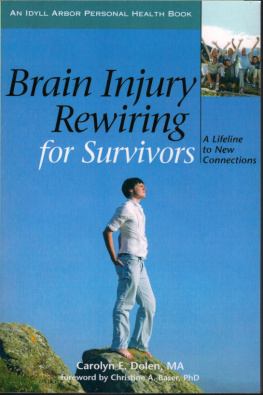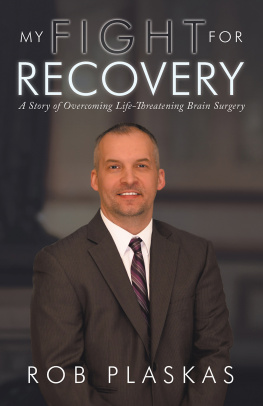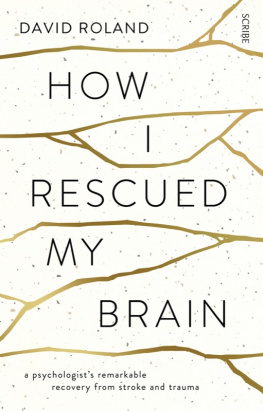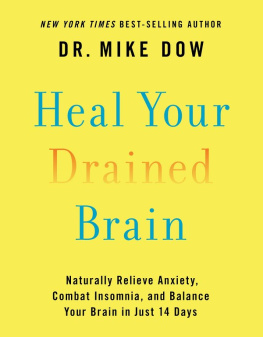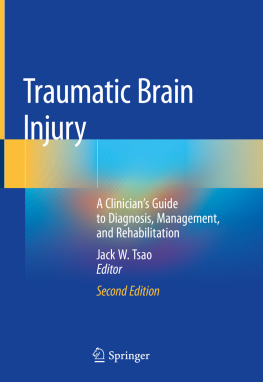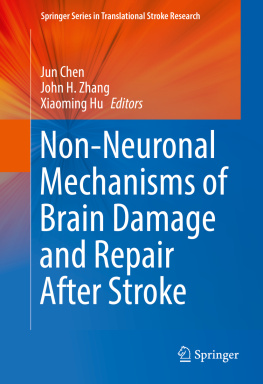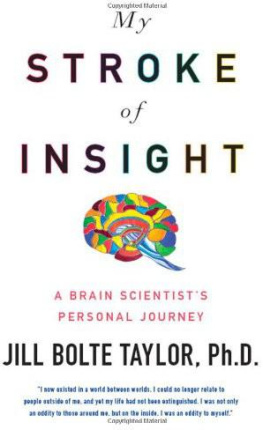This book demonstrates one practical application of an emerging truth in the healing artsthat creating a positively energized home environment is an important aspect in recovery from any disorder, including brain trauma.
Nikki Marie Welch, M.D., M.D.(H), Sedona, Arizona
This book is a page-turner. The author's humor and vivid writing drew me in immediately. I had to keep reading until I found out how these women, using their life experiences, made the impossible real.
Suzanne Zuercher, clinical psychologist
and author of two books: Enneagram
Spirituality and Enneagram
Brain, Heal Thyself is a compelling tale of resiliency and grace. Siles relates her experiences with honesty and humor, offering substantive insights to professionals, caregivers, and stroke victims themselves. Eve's ongoing recovery, which I've been privileged to witness, is testimony to the power and dignity of the human spirit. An inspiring, encouraging work.
Thea Jarvis, Eve's college roommate and
author of The Gift of Grandparenting
Brain, Heal Thyself is a well-written, engaging story of devotion, tenacity and a miraculous recovery from devastating trauma.
Thomas W. Phelan, Ph.D., author of
1-2-3 Magic: Effective Discipline
for Children 212

Copyright 2006
by Madonna Siles
All rights reserved, including the right to reproduce this work in any form whatsoever, without permission in writing from the publisher, except for brief passages in connection with a review.
Cover design by Steve Amarillo
Cover art Jupitermedia Corporation. All rights reserved.
Hampton Roads Publishing Company, Inc.
1125 Stoney Ridge Road
Charlottesville, VA 22902
434-296-2772
fax: 434-296-5096
e-mail:
www.hrpub.com
If you are unable to order this book from your local bookseller, you may order directly from the publisher.
Call 1-800-766-8009, toll-free.
Library of Congress Cataloging-in-Publication Data
Siles, Madonna.
Brain, heal thyself : a caregiver's new approach to recovery from stroke, aneurysm, and traumatic brain injuries / Madonna Siles.
p. cm.
Summary: Part memoir, part recovery manual, Brain, Heal Thyself is a guidebook for unexpected caregivers. Siles recounts moment-by-moment the journey of her friend Eve's near-fatal aneurysm to ER to rehab center to at-home care and, finally, to recovery. Includes visualizations and subliminal methods for invoking the power of emotions and the subconscious mind in the healing process--Provided by publisher.
Includes bibliographical references and index.
ISBN 1-57174-476-2 (5 1/2 x 8 1/2 tp : alk. paper)
1. Cerebrovascular disease--Patients--Rehabilitation. 2. Cerebrovascular disease--Patients--Biography. 3. Aneurysms--Patients--Rehabilitation. 4. Aneurysms--Patients--Biography. 5. Brain--Wounds and injuries--Alternative treatment. 6. Caregivers. I. Title.
RC388.5.S49 2006
362.196'810092--dc22
2005037766
ISBN 1-57174-476-2
10 9 8 7 6 5 4 3 2 1
Printed on acid-free paper in Canada
www.redwheelweiser.com
www.redwheelweiser.com/newsletter
To my parents, Mary and Steve,
who gave me the good life...
and to my A.A. friends and sponsors
who taught me how to live it
Contents
Acknowledgments
Without the 12-Step program of Alcoholics Anonymous, Eve and I would never have met. Now, how much fun would that have been? Thanks, Eve, for sharing the past 12 years with me as we trudge the road of happy destiny.
In addition, I have relied on the feedback of friends and experts while writing this book. Thank you, Valerie Samuelson and Peggy Savides, R.N., for your invaluable input at every stage of this book. Special thanks to Kevin Beuret, who edited the final manuscript.
My gratitude extends to my commentators and cheerleaders, including: Fran Holdren, Jennifer Berns, Gloria Muczynski, Chrissy Shults, Jean Handel-Bailey, Fran Corn, Karen Piwowarski, Patricia Fanella-DeVito, Gina Ward, Thea Jarvis, Cathy Causby, Paul Savides, Neil O'Shea, Deborah Fleck, Tania Seymour, Sara Sgarlat, Mark Knoblauch, Carol Morgan, Ph.D., and Sue Powers, R.N.
I am also forever grateful for the support of my friends Merle, the late (great) Roger Ketelsen, and Patricia Moeller, who lost her battle with cancer a year ago. I miss Roger and Pat very much. There are many others who helped Eve and me on the road to recovery in many different ways. They include: Yolanda, Ginny, Arlene and Jim Smith, Penny and Ron Latko, Alex and Lynn, Carlie Koss, Chuck Kaleta, Norm and Doris, Jim Berns, Eileen, G. J., Greg, Dan Rubino, Carolyn Halenza, Laura, Marion, Mary, Auntie Simone, Tony Costanza, Bruce Shivley, Alice Grippe, Carol Stevenson, Peg, Laurie, Diana, Kathy White, and Nikki Welch, M.D. We thank you.
We are indebted to the health professionals who went beyond their professional calling to help Eve and to support me.
Special thanks to Max Ots, M.D.; Tracy Bielinski, R.N.; Mary Vietzke, R.N.; Sharon Prosser, B.S.W.; Julie Feld, M.S.W.; Patti Seeman, C.O.T.A.; Leo Grieben, M.D.; Karen Butler, M.D.; and Bonnie Davis. Many others were there with kind acts or encouraging words when we needed them. If I had known I was going to write a book, I would have recorded all their names. You know who you are. We thank you, one and all. May God bless you.
Foreword
In 1987, my eight-year-old daughter experienced a serious brain injury when she was hit by a car. In 1995, the teenaged son of friends sustained a head injury when he was a backseat passenger in a car that went off the road and rolled several times. Most recently, another family's son, a 21-year-old soldier in the U.S. Army in Iraq, incurred serious brain damage when a roadside bomb blew up his vehicle.
A litany of tragedies, yes, and each was followed by a lengthy and expensive hospitalization. When these patients finally went home, another trauma occurred, but this time it did not happen to the patients. It happened to the caregivers. They were suddenly thrust into the role of caregivers to a brain-injured person. Totally unprepared and armed only with love and an urgent desire to bring them back, they took over where hospital rehabilitation left off.
When my daughter came home from the hospital, many people commented that our family was lucky because I was a registered nurse. They implied that my professional training had equipped me with the knowledge and skills to manage recovery at home. Nothing could have been further from the truth!
The fact is, nobody is really prepared to care for someone with a brain injury or stroke. It would have been great to have a set of instructions or a rehabilitation formula to follow, but instead almost everything we were told or read contained the qualifier: Every brain injury is different.
Thankfully, in Brain, Heal Thyself, Ms. Siles invites us to look for the similarities between her case and ours. She proceeds to apply the universal rules of nonverbal, subconscious communication to her brain-recovery situation and asks us to do the same. Then she surprises us by employing advertising strategies as rehabilitation motivational tools and 12-Step program concepts to facilitate the two-way communication process. It certainly appears that these positive methods work much better than the cajoling, controlling, bribing, and browbeating we were often reduced to when we got frustrated.
In the years that our daughter was recovering, there were few support services available for brain injuries, and even fewer for the caregivers. Then, as now, we searched for answers in self-help materials. At last we have found what we were looking forcreative rehabilitation ideas, inspiration to develop our own new methods, and recovery hope without unrealistic expectationsin my friend's book,
Next page
